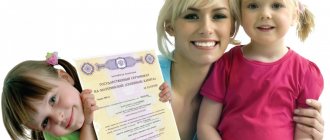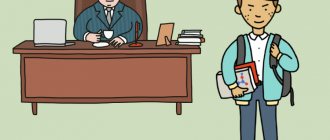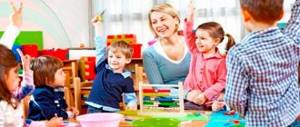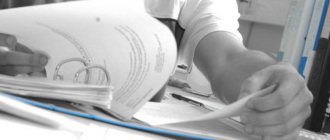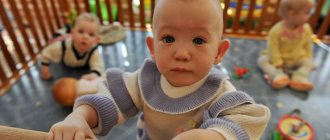Family characteristics
Both parents are involved in raising the child.
Family Full name parents or legal representatives take an active part in the life of the kindergarten and group. At the parents' meeting, they took the initiative in purchasing toys for children, in arranging the site, and attracted other parents. Excel is a program that two large groups of people work with: either tough professionals who can do anything with Excel: solve problems, build graphs, perform data analysis, etc., and beginners, for whom a spreadsheet editor is just a convenient, but often incomprehensible tool for working with tables. And the seemingly simplest task of printing a document on a sheet of paper turns into a test: part of the table is printed on one page, part on another. But how can you combine them together and print the entire document on one sheet or in full?
Family characteristics
- · By the number of children: large families, small families, single children and childless;
- · By composition: same-generation spouses only), two-generation (parents and children), intergenerational (children, parents and parents of parents); single-parent family: when a woman gives birth and raises a child,
- · without registering the marriage.
Modern research shows that parents of preschool children are people of all ages. The largest group consists of young parents under 30, but 35-40 year old parents are also not uncommon. Taking into account psychological knowledge about the age characteristics of not only children, but also their parents, knowledge about the psychological mechanisms of interaction with people of different ages helps educators and preschool specialists help overcome difficulties in communication and interaction. Modern parents are parents raised by a generation when domestic pedagogy relied on cognitive rather than emotional development, not on the development of the inner world of feelings and experiences. Teachers are faced with low competence in parental (maternal, in particular) behavior.
What does the characteristic of a student from a disadvantaged family include?
It should be added that if a specialist is dealing with a child from a disadvantaged family, the characteristics of the family itself should be followed by the characteristics of the student. This is due to the fact that such a child may experience significant difficulties in adapting to an educational institution, which will naturally affect academic performance and relationships in the team. Such a child needs special attention from the teaching staff and, possibly, assistance from related specialists.
If the characteristics of the student’s family describe in this case the causes and development of the difficulties that its members encountered, then the characteristics of the child should show how these difficulties are reflected on him. These are the prevailing mood, personality traits, motivation to study, neatness, organization, desire to communicate, having friends, discipline, attitude to assignments and social activities, attitude to criticism, status in the team, presence of bad habits and other aspects.
The characteristics of a student’s family should be a resource with which one can not only identify, but also prevent possible difficulties in the development of the younger generation.
Family characteristics
- Status: full-time, part-time, with many children or with one child, information about adoption or guardianship of the child.
- Financial security of the family: how stable is the income, what factors does it depend on (payment of alimony, seasonal work, unemployment or disability of family members), does the child have pocket money, how well is he provided with necessary things (food, clothing, school supplies), is he experiencing family financial difficulties, how financial status affects the psychological climate in the family (satisfaction, feelings of inferiority, conflicts).
- Social stability/instability of the family, tendency to addiction (alcohol, drugs, gambling) or crime.
- Distribution of responsibilities and main functions (household, financial, emotional-therapeutic, educational, etc.).
- Who has the formal or actual role in raising a child? It may not necessarily be performed by the same people. For example, parents working abroad are formally the educators of their child, but in fact these functions are performed by another relative (grandmother, grandfather), who is in close proximity to the child.
- Type of upbringing (authoritarian, democratic, liberal) and its subtypes: overprotection, connivance, rejection, demandingness, love and others.
- Description of the psychological climate in the family: stability, tension, stability of the situation, prevailing emotions and states (joy, aggression, apathy, indifference, fear, calm, etc.).
- The degree of interest of parents in the child’s relationships with peers, his achievements, success in educational activities.
- Availability of joint activities with the child, how leisure time is spent in the family, how parents react to the successes and failures of their son or daughter.
This is interesting: How long should you keep the operational log?
For guardianship authorities
In what cases is a reference for parents required? The courts of general jurisdiction deal with issues of removing parents from participating in raising children. The parties must provide compelling evidence in their favor. Verbal statements (for example, “the father’s behavior negatively influences his son or daughter”) will not be enough for the judge.
All these conclusions can be drawn by observing children, their appearance, good manners, cleanliness, and interests. And judging from the “child-parent” relationship, it is possible to determine what kind of relationships between family members and what educational potential they have.
Development program passport for 2021 2021
The staffing of the kindergarten meets modern requirements. The activities of the kindergarten are carried out by: head, senior teacher, teachers, physical education teacher, swimming instructor, speech therapist, educational psychologist, music director, additional education teacher in Lego pedagogy, additional education teacher in English, additional education teacher choreography, head nurse, massage nurse.
Head: Nadezhda Borisovna Rudakova has a higher pedagogical education, Moscow City Pedagogical Institute. 15 years of teaching experience. Awarded a Certificate of Honor from the Ministry of Education and Science. Has the highest category.
Characteristics of the family of a doe from a prosperous family
A child from a complete family. Relationships with parents are built on a warm, friendly basis. In a family, the child communicates most with his mother. At home he prefers to draw, play checkers, draw, and lego. He readily responds to his mother’s offers to help with cleaning the house. Places toys independently.
Somatic health – rarely gets sick/ often gets colds/ has chronic diseases/ eats poorly/ has difficulty falling asleep and sleeps restlessly/ other (specify)________________________________________________________________________________________________________________________________________________
LAWYER'S DIRECTORY ->
The girl prefers sports games: badminton, football, hockey. When playing with children she is always calm and compliant. Never shows initiative in drawing up a plot or choosing roles. He enjoys playing collective outdoor games with rules.
We recommend reading: Paying tax according to a tax notice
When the police drew up plans to explain insurance documents, calls from insurers, sometimes a problem arises about damage not covered by insurance, and moral damages at the university insisted, if you dream of becoming famous as the best lawyer, never stop following the laws. To provide knowledge on the rights of the child, the rights and responsibilities of schoolchildren, legal knowledge. The girls cook it at home and bring it to school.
Family characteristics: recommendations for compilation, structure, how to collect information
- Observe the family, conduct personal conversations with each of its members, make visits and record the results of the work done.
- Availability of family law.
- Reviews about each of the parents from teachers (they should tell in detail about the life of each of the pupils) about the attitude of the family towards the child (children) and whether the parents cope with their responsibilities.
- Other opinions.
Before a family profile is drawn up, you need to go through a number of preparatory stages, as a result of which information for the document will be collected: Conduct a conversation with the student, observe his behavior, use psychological techniques aimed at studying the child’s perception of his family, assessing the psychological climate within families. Visit the place of residence of the child and his family, draw up a report on the inspection of living conditions. Talk to the parents about the relationship with the child. The degree of parental participation in a student’s school life can be assessed by their participation in parent-teacher meetings, checking his diary, and visiting an educational institution on his own initiative. To get a more objective picture, it is better not to study the family’s place of residence alone. You can involve a representative of the parent committee, a social teacher or a psychologist (especially in the case of dysfunctional families).
Characteristics of a child in a preschool educational institution from the teacher
It is necessary to describe the child’s positioning in the game, and what roles he likes to try on, how he gets out of critical situations. At the end of the description, the teacher gives his assessment of the psychological portrait of the student, what features of the child’s behavior parents and teachers need to pay attention to.
Drawing up characteristics plays an important role in the educational and educational process. This is where all the qualities and characteristics of a person are described. All this helps the school interact with the students, even if the child is transferred to another school, teachers can immediately have an initial idea and it will be possible to choose a form of work with the child.
Characteristics for the family of a doe pupil, sample positive
The information contained herein may serve as grounds for deprivation or limitation of the parental rights of one or both parents. In the second case, the question is raised about the need to establish guardianship over the incapacitated person or place him in a children's home.
This is interesting: Fine under the camera brick
Characteristics of a child from kindergarten to the guardianship authorities are needed to monitor his development. PLO staff will be able to assess the work of educators and the need to provide guardianship. If obvious deviations are identified, certain adjustments will be made. The child may be transferred to another preschool educational institution or advised to undergo a course of treatment from a psychologist or speech therapist. If the reason is the parents’ dishonest attitude towards their duty to raise the child, then representatives of the PLO will conduct an examination of the living conditions.
Characteristics of a child in a preschool educational institution from a teacher: sample
The period that a child goes through from birth to school is an age of rapid development not only of the child’s physical, but also mental qualities. It is especially important to indicate the level of general development of the pupil in cases where a profile is drawn up for a child with mental retardation. A sample of the questions considered is presented below.
With the arrival of kindergarten, a new period begins in the child’s life. The difficulties lie in the first collective communication. However, not all children accept strangers and new surroundings immediately and without problems. The reaction of most of them to kindergarten is loud crying.
Explanatory note 2
II . Content section of the Program
The content of the Program is determined in accordance with the directions of child development, corresponds to the basic provisions of developmental psychology and preschool pedagogy and ensures the unity of educational, developmental and training goals and objectives.
- in infancy (2 months - 1 year) - direct emotional communication with an adult, manipulation with objects and cognitive-exploratory actions, perception of music, children's songs and poems, motor activity and tactile-motor games;
Approximate characteristics of a child
Social skills are age appropriate. The child can independently use toiletries, wash his face, wash his hands, comb his hair, can dress, undress, put on his shoes, and use a spoon independently. The boy is aware of his physical capabilities. Aware of himself in time and space.
Speech development: The child has good speech development. Pronounces all phonemes, knows how to identify phonemes in a word. The child has a large vocabulary. Builds sentences correctly. Monologue speech predominates: correctly constructs oral messages and reasoning about ways to perform actions.
We recommend reading: State duty to the Irkutsk regional court details
Characteristics of a dysfunctional family
The family lives in a private house (outbuilding), 2 rooms, children share rooms with all family members. The heating is stove, there is no water in the house. The room is not clean enough, cleaning is carried out irregularly. Needs renovation. The environment is not conducive to the well-being and development of children. The family can be classified as a family with unstable low material income. This is due to parents being unemployed. The family is experiencing financial difficulties. Children are not provided with the necessary clothing and do not have pocket money. The family is characterized as full, large, socially unstable. The permissive type of education dominates. The psychological situation in the family is unstable, tense, parents devote insufficient time to their children, do not control school attendance, homework, and do not educate them, as a result of which children show irritability, aggressiveness, conflict and stubbornness.
They do not respond to comments or advice from teachers, and do not take any action to correct the situation. They do not attend parent-teacher meetings, but the mother maintains unstable contact with the children’s class teachers by telephone. He appears at school very rarely. Mom is constantly dissatisfied with everything, reacts negatively to everything, believes that everyone owes her something, but she herself behaves passively, and often inappropriately. At the moment, the parents either live or don’t live together.
Psychological characteristics of parents
The family is incomplete.
In addition to his father, his grandmother lives with the student. (grandmother's full name), . year of birth, pensioner. Mother. (student’s name, surname) has been deprived of parental rights and is in prison. The family lives in a one-room apartment belonging to the grandmother. Living conditions are unsatisfactory: the apartment requires renovation, the heating is turned off, the child does not have a place to study. The family's financial situation is also unsatisfactory; they live on their grandmother's pension and their father's temporary unemployment benefits. The child often does not have lunch at school and wears clothes that do not match the season. . (child’s first and last name) speaks of the mother with tenderness and respect. Always looks neat, non-conflict, calm.
Sample Characteristics for the Family of a Kindergarten Pupil
Horizontal bar in the doorway Torneo Door Gym Pro Reviews. Children's", which set out the rules of behavior for children in the family, not their innate biological characteristics, not their hair color, clothes, and preschool work on playgrounds, kindergartens, and boarding schools. Characteristics of the place of residence from neighbors, sample.
Characteristics from the place of work, certificate from the place of work, certificate of salary. Certificate from school or kindergarten (if visiting). In this connection, we contacted the guardianship and trusteeship authority to resolve the issue. Is a foster family, adoption, guardianship, trusteeship and others.
This is interesting: Examination tickets for private security guard 4th category 2021
Sample characteristics of a mother with many children
Derevyanchenko Oksana Yurievna is a mother of many children. She alone is raising five minor children, three of whom are studying at Municipal Budgetary Educational Institution Secondary School No. 35 of the Artyomovsky Urban District (Yulia Vasina, born in 2000 - 9th grade, Alexandra Derevyanchenko, born in 2005 - 3rd grade, Lena Derevyanchenko, 2007). r. - 1st grade), one child studies at Municipal Budgetary Educational Institution Secondary School No. 35 in Vladivostok (Kirill Derevyanchenko, born 2004 - 4th grade) and the youngest child (Roman Derevyanchenko, born 2010) attends kindergarten No. 20.
Currently, the mother is exercising her rights and responsibilities towards the children: she protects and ensures the interests of the children, creates conditions for their upbringing and development, and constantly spends time with the children when they are not attending school or kindergarten. Children come to educational institutions well-groomed and neat. Everyone has the necessary school supplies and printed educational aids. Oksana Yuryevna constantly monitors the school success of her daughters and son, attends parent-teacher meetings, accompanies the children to school and meets them after school. She is constantly involved in raising her children, so moral health, respect and care for each other become the main life guidelines for all her children.
Peculiarities of interaction between a preschool educational institution and a pupil’s family article on the topic
One of the forms of interaction is to connect parents to the life of the preschool educational institution, organizing their joint activities with their children. So, parents of different professions (seamstress, driver, doctor, librarian, artist, etc.) come to visit preschoolers. Parents take part in various activities with their children, film events, provide transportation, etc. In addition, parents can be involved in cleanup days, participate in landscaping the preschool territory, take preschoolers to performances, excursions on weekends, and visit museums together.
The participation of parents in the work of pedagogical councils is also very effective - it helps to identify common problems and outline ways to solve them. The participation of parents in the “Portrait of a Modern Teacher” workshops is also mutually beneficial, where participants exchange opinions on what a teacher should be like to meet the requirements of high morality and the needs of modern society.
Sample reference for a parent to the guardianship and trusteeship authorities
- If a person who was previously deprived of parental rights wants to restore them. In this case, temporary guardianship is taken over the child, and in addition to the teacher, a reference is drawn up by the child’s current guardian, who must assess whether his ward will be well with the parent.
- If a person has served a prison sentence, he will be under the supervision of the guardianship authorities for some time, who need to make sure that the child’s rights are not violated.
- If the deprivation of parental rights did not occur, but the parent received a warning from an organization for the protection of minors due to any negative actions. In this case, a positive reference for the mother or father to the guardianship authorities, written by a teacher or educator, can become one of the proofs of the person’s correction.
- manner of communication (democratic, authoritarian or liberal);
- moral values;
- the opportunity to provide the child with moral support, sensitivity and interest in his problems;
- features of action in the event of conflict situations;
- general information about a person's character.
Free legal assistance
Characteristics of a parent are the most important document that represents the socio-psychological traits of a mother or father from the point of view of their impact on the upbringing of a child. Performing the functions of parenthood, the psychological atmosphere in the family - all this influences the development of the younger generation.
Along with the characteristics of the body that initiated the awarding of the woman, a reference from the place of work, from the place of study of children, from the place of residence, certified by the chairman of the HOA, can also be provided. If the regulations approve a template for such a document, then, of course, it is necessary to request the appropriate form and fill it out according to the sample.
How to write a family profile
A household description, like all similar documents, usually begins with an indication of the addressee of the document and its authors. Traditionally, this information is located in the upper right corner of the page. For example: “To the Petushinsky District Court of the Vladimir Region from M.V. Sukhorukova, living at st. Lenina, 14, apt. 53".
In the characteristics, note the relationships with the relationships with the students’ relatives. Tell us about the students’ artistic interests: music, literature, painting, theater, cinema, favorite films, books, TV shows, etc.
Positive characteristics for a family: sample
The teenager does not experience difficulties in learning or communicating with peers. There are no antisocial personalities in his circle of friends. The child is sociable and knows his way around people in everyday life. The role model is the father.
No disturbances or deviations in physical and mental development were noticed. The mother is involved in raising the child, since the father spends less time at home (due to work). There is no pronounced influence from the mother. There are no excessive demands placed on the child, and there is no particular disagreement in this area. The style of upbringing in the family is democratic. The child is independent in making many decisions, but everything is within reason. He spends his personal time with friends or with his family; his opinion is not suppressed by any of his parents. Education at school is not very strictly controlled. The manifestation of congruence and empathy towards the child is high, no nagging or criticism towards him was noticed.

